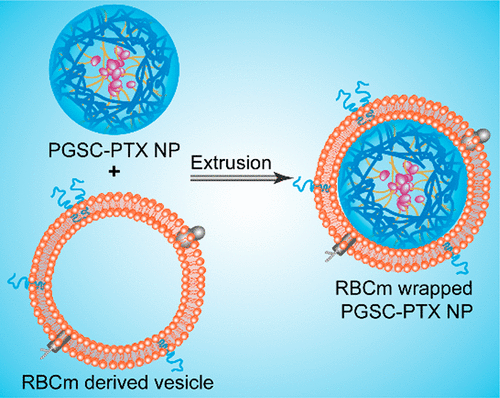当前位置:
X-MOL 学术
›
Bioconjugate Chem.
›
论文详情
Our official English website, www.x-mol.net, welcomes your feedback! (Note: you will need to create a separate account there.)
Erythrocyte Membrane-Wrapped pH Sensitive Polymeric Nanoparticles for Non-Small Cell Lung Cancer Therapy
Bioconjugate Chemistry ( IF 4.7 ) Pub Date : 2017-09-14 00:00:00 , DOI: 10.1021/acs.bioconjchem.7b00428 Lipeng Gao 1 , Hao Wang 1 , Lijuan Nan 1 , Ting Peng 1 , Lei Sun 1 , Jinge Zhou 1 , Ye Xiao 1 , Jing Wang 1 , Jihong Sun 2 , Weiyue Lu 3 , Lin Zhang 4 , Zhiqiang Yan 1 , Lei Yu 1 , Yiting Wang 1
Bioconjugate Chemistry ( IF 4.7 ) Pub Date : 2017-09-14 00:00:00 , DOI: 10.1021/acs.bioconjchem.7b00428 Lipeng Gao 1 , Hao Wang 1 , Lijuan Nan 1 , Ting Peng 1 , Lei Sun 1 , Jinge Zhou 1 , Ye Xiao 1 , Jing Wang 1 , Jihong Sun 2 , Weiyue Lu 3 , Lin Zhang 4 , Zhiqiang Yan 1 , Lei Yu 1 , Yiting Wang 1
Affiliation

|
The application of nano drug delivery systems (NDDSs) may enhance the effectiveness of chemotherapeutic drugs in vivo. However, the short blood circulation time and poor drug release profile in vivo are still two problems with them. Herein, by using red blood cell membrane (RBCm) wrapping and pH sensitive technology, we prepared RBCm wrapped pH sensitive poly(l-γ-glutamylcarbocistein)-paclitaxel (PGSC–PTX) nanoparticles (PGSC–PTX@RBCm NPs), to prolong the circulation time in blood and release PTX timely and adequately in acidic tumor environment. The PGSC–PTX NPs and PGSC–PTX@RBCm NPs showed spherical morphology with average sizes about 50 and 100 nm, respectively. The cytotoxicity of PGSC–PTX@RBCm NPs was considerably decreased compared with that of PGSC–PTX NPs. PTX release from PGSC–PTX and PGSC–PTX@RBCm NPs at pH 6.5 was remarkably higher than those at pH 7.4, respectively. The PGSC–PTX@RBCm NPs exhibited remarkably decreased uptake by macrophages than PGSC–PTX NPs. The area under the curve within 72 h (AUC0–72h) for is significantly higher than PGSC–PTX NPs. The PGSC–PTX@RBCm NPs also showed significantly stronger growth-inhibiting effect on tumor than PGSC–PTX NPs. These results indicated that PGSC–PTX@RBCm NPs have acidic drug release sensitivity, the characteristics of long circulation, and remarkable tumor growth inhibiting effect. This study may provide an effective strategy for improving the antitumor effect of NDDS.
中文翻译:

红细胞膜包裹的pH敏感聚合物纳米粒子的非小细胞肺癌治疗。
纳米药物递送系统(NDDSs)的应用可以增强体内化学治疗药物的有效性。然而,体内血液循环时间短和药物释放特性差仍然是它们的两个问题。本文中,通过红细胞膜包裹和pH敏感技术,我们制备了RBCm包裹的pH敏感聚合物(l-γ-谷氨酰胺基羧甲基)-紫杉醇(PGSC-PTX)纳米颗粒(PGSC-PTX @ RBCm NPs),以延长血液循环时间,并在酸性肿瘤环境中适时释放PTX。PGSC–PTX NP和PGSC–PTX @ RBCm NP呈球形,平均大小分别约为50和100 nm。与PGSC–PTX NP相比,PGSC–PTX @ RBCm NP的细胞毒性大大降低。在pH 6.5时,PGSC-PTX和PGSC-PTX @ RBCm NPs释放的PTX分别显着高于在pH 7.4时释放的PTX。与PGSC-PTX NPs相比,PGSC-PTX @ RBCm NPs的巨噬细胞摄取显着降低。72小时内曲线下的面积(AUC 0–72h)明显高于PGSC–PTX NP。PGSC–PTX @ RBCm NPs也显示出比PGSC–PTX NPs强得多的对肿瘤的生长抑制作用。这些结果表明,PGSC–PTX @ RBCm NPs具有酸性药物释放敏感性,长循环特征和显着的抑瘤作用。这项研究可能为提高NDDS的抗肿瘤作用提供有效的策略。
更新日期:2017-09-14
中文翻译:

红细胞膜包裹的pH敏感聚合物纳米粒子的非小细胞肺癌治疗。
纳米药物递送系统(NDDSs)的应用可以增强体内化学治疗药物的有效性。然而,体内血液循环时间短和药物释放特性差仍然是它们的两个问题。本文中,通过红细胞膜包裹和pH敏感技术,我们制备了RBCm包裹的pH敏感聚合物(l-γ-谷氨酰胺基羧甲基)-紫杉醇(PGSC-PTX)纳米颗粒(PGSC-PTX @ RBCm NPs),以延长血液循环时间,并在酸性肿瘤环境中适时释放PTX。PGSC–PTX NP和PGSC–PTX @ RBCm NP呈球形,平均大小分别约为50和100 nm。与PGSC–PTX NP相比,PGSC–PTX @ RBCm NP的细胞毒性大大降低。在pH 6.5时,PGSC-PTX和PGSC-PTX @ RBCm NPs释放的PTX分别显着高于在pH 7.4时释放的PTX。与PGSC-PTX NPs相比,PGSC-PTX @ RBCm NPs的巨噬细胞摄取显着降低。72小时内曲线下的面积(AUC 0–72h)明显高于PGSC–PTX NP。PGSC–PTX @ RBCm NPs也显示出比PGSC–PTX NPs强得多的对肿瘤的生长抑制作用。这些结果表明,PGSC–PTX @ RBCm NPs具有酸性药物释放敏感性,长循环特征和显着的抑瘤作用。这项研究可能为提高NDDS的抗肿瘤作用提供有效的策略。



























 京公网安备 11010802027423号
京公网安备 11010802027423号